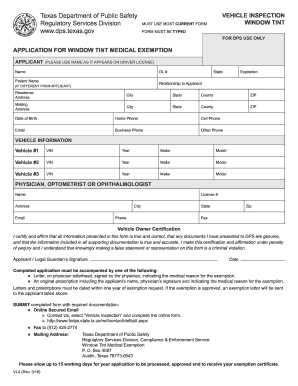Last Updated on January 29, 2024 by Vadym

Window tint is a popular modification for cars, as it can provide numerous benefits such as reducing glare, blocking harmful UV rays, and increasing privacy. However, in many places, there are legal restrictions on how dark you can tint your windows. In some cases, individuals may require a prescription in order to have windows tinted beyond the legal limit.
So, can you get a prescription for window tint? The answer is yes. In certain situations, individuals with medical conditions that require protection from excessive sunlight may be able to obtain a prescription for window tint. These medical conditions can include conditions such as photosensitivity, skin cancer, or certain eye disorders.
Having a prescription for window tint allows individuals to have their car windows tinted beyond the legal limit, as it is considered a medical necessity. However, it is important to note that not all states or countries may recognize window tint prescriptions, and the process of obtaining a prescription may vary.
If you believe you have a medical condition that requires window tint for your car, it is recommended to consult with a medical professional who can evaluate your condition and determine if a prescription is necessary. Additionally, it is important to research and familiarize yourself with the laws and regulations regarding window tint in your specific location to ensure compliance.
Understanding Window Tinting

Window tinting is a process that involves applying a thin film to the windows of a vehicle or building. This film is made of polyester and has a layer of adhesive on one side. The film can be clear, allowing for maximum visibility, or it can be tinted to reduce the amount of light that passes through the window.
Window tinting offers a variety of benefits. One of the primary benefits is increased privacy. Tinted windows make it difficult for people outside to see into a vehicle or building, providing occupants with a greater sense of security and privacy. In addition, window tinting can also reduce the amount of heat that enters a vehicle or building, helping to keep the interior cooler and more comfortable.
Another advantage of window tinting is protection from harmful UV rays. The film used in window tinting is designed to block a significant amount of UV radiation, which can be harmful to the skin and eyes. By reducing the amount of UV rays that enter a vehicle or building, window tinting can help prevent sunburn and eye damage.
Window tinting is regulated by laws in many jurisdictions. These laws specify the maximum darkness or reflectivity allowed for window tinting films. The purpose of these regulations is to ensure that drivers and passengers can see clearly out of the windows and that law enforcement officers can see inside a vehicle if necessary. It is important to familiarize yourself with the laws in your area before having your windows tinted to avoid any potential legal issues.
When it comes to window tinting, it is important to choose a reputable professional to perform the installation. Poorly installed window tint can bubble, peel, or become discolored over time. A professional installation will ensure that the tint is applied correctly and will last for years to come.
Overall, window tinting is a popular choice for vehicle owners and homeowners alike. Whether you are seeking increased privacy, heat reduction, or protection from harmful UV rays, window tinting can provide a range of benefits. By understanding the process and laws surrounding window tinting, you can make an informed decision and enjoy the advantages that window tinting has to offer.
The Benefits of Window Tinting
Window tinting offers a range of benefits for both residential and commercial properties. Here are some of the key advantages:
| 1. Increased privacy: | Tinted windows provide privacy by preventing outsiders from seeing inside your property. This is particularly useful for homes and businesses located in busy areas. |
| 2. Energy efficiency: | Window tinting helps to reduce heat gain during hot summer months and heat loss during cold winter months. This decreases the need for air conditioning and heating, leading to lower energy bills. |
| 3. UV protection: | Tinted windows block a significant amount of harmful UV rays from entering your property. This helps to protect your skin and eyes from damage and prevents furniture and fabrics from fading. |
| 4. Glare reduction: | Tinted windows reduce glare from the sun, making it easier to see screens and displays. This is beneficial for both residential homes and commercial spaces, such as offices and retail stores. |
| 5. Enhanced safety: | Window tinting provides an extra layer of protection by reinforcing glass and making it harder to break. In the event of an accident or break-in, the film helps to hold the glass together, reducing the risk of injury from shattered glass. |
| 6. Improved aesthetics: | Tinted windows can enhance the overall look of a property, giving it a sleek and modern appearance. There are various tinting options available, allowing you to choose the level of darkness and style that best suits your preferences. |
Overall, window tinting is a worthwhile investment that can improve comfort, protect your property, and save you money in the long run. Whether it’s for privacy, energy efficiency, or aesthetic purposes, tinted windows offer numerous benefits for residential and commercial applications.
Legal Requirements for Window Tinting
Window tinting is a popular modification that many car owners choose to have done to their vehicles. However, it is important to understand the legal requirements surrounding window tinting to avoid any potential fines or penalties.
The legality of window tinting varies from state to state and even from country to country. In the United States, each state has its own laws and regulations regarding the darkness and reflectivity of window tinting. These laws are put in place to ensure the safety of both the driver and other road users.
Most states have specific laws that dictate the maximum allowable tint darkness for different windows of a vehicle. Generally, the front windshield must have a lighter tint compared to the side and rear windows. The percentages for allowable tint darkness can range from as low as 20% to as high as 70%, depending on the state.
In addition to tint darkness, many states also have regulations regarding the reflectivity of the window tint. Excessive reflectivity can be distracting to other drivers on the road, so it is important to adhere to these regulations. Some states may require that the reflectivity of the window tint must not exceed a certain percentage.
It is also worth noting that certain types of vehicles, such as commercial vehicles or emergency vehicles, may have additional restrictions on window tinting. This is to ensure the safety and visibility of these vehicles while on the road.
| State | Maximum Front Tint Darkness | Maximum Side Tint Darkness | Maximum Rear Tint Darkness |
|---|---|---|---|
| Alabama | 32% | 32% | 32% |
| Alaska | 70% | 40% | 40% |
| Arizona | 33% | 25% | 25% |
| Arkansas | 25% | 25% | 10% |
| California | 70% | 70% | 70% |
| Colorado | 27% | 27% | 27% |
Before getting your windows tinted, it is essential to familiarize yourself with the specific laws and regulations in your state. Failure to comply with these legal requirements can result in fines, vehicle inspections, or even the removal of the window tint.
It is advisable to consult with a professional tinting service that is knowledgeable about the local laws to ensure that your window tinting is compliant. They can guide you through the process and help you choose a tint that meets the legal requirements while also achieving the desired level of privacy and aesthetic appeal for your vehicle.
Medical Conditions and Window Tinting
Window tinting can serve as more than just an aesthetic upgrade for your vehicle. In some cases, it can be a beneficial addition for individuals with specific medical conditions. While window tinting is primarily known for providing privacy and reducing glare, it can also offer relief and protection for those who suffer from certain health issues.
One of the primary benefits of window tinting for individuals with medical conditions is the reduction of harmful UV rays. Excessive exposure to UV rays can worsen symptoms for those with photosensitive conditions, such as lupus, xeroderma pigmentosum, or solar urticaria. By applying window tinting with UV protection film, individuals can minimize their exposure to these harmful rays and potentially alleviate symptoms.
Window tinting can also provide relief for individuals who suffer from migraines and other light-sensitive conditions. Bright lights, including sunlight, can trigger migraines and exacerbate symptoms. By reducing the amount of light that enters the vehicle through window tinting, individuals can experience a decrease in the frequency and severity of their migraines.
In addition to reducing light and UV exposure, window tinting can also help regulate the temperature inside the vehicle. This can be particularly beneficial for individuals with conditions that make them sensitive to heat, such as multiple sclerosis or fibromyalgia. By adding window tinting, the interior of the vehicle can remain cooler, reducing the risk of symptom flare-ups.
It’s important to note that while window tinting can provide relief for some individuals with medical conditions, it may not be a suitable solution for everyone. It’s always recommended to consult with a healthcare professional before making any modifications to your vehicle in order to ensure that it’s the right choice for your specific needs.
In conclusion, for individuals with certain medical conditions, window tinting can offer more than just a cosmetic upgrade. It can provide relief from symptoms, reduce harmful UV exposure, and help regulate vehicle temperature. If you have a medical condition that may benefit from window tinting, consult with a healthcare professional to determine if it’s an appropriate solution for you.
Getting a Prescription for Window Tinting
If you have a medical condition that requires you to limit your exposure to ultraviolet (UV) radiation, you may be able to get a prescription for window tinting for your vehicle. Window tinting can help block harmful UV rays and reduce the amount of heat entering your car, providing you with a safer and more comfortable driving experience.
To obtain a prescription for window tinting, you should start by consulting with your healthcare provider. Explain your specific medical condition and the need for UV protection. Your healthcare provider will evaluate your situation and determine if window tinting is a suitable solution for you.
If your healthcare provider determines that window tinting is necessary, they will provide you with a written prescription. This prescription should specify the degree of tinting allowed, the windows that need to be tinted, and any other relevant details. It’s important to follow your healthcare provider’s instructions and guidelines for window tinting to ensure that you are in compliance with legal requirements.
With the prescription in hand, you can then take your vehicle to a professional window tinting service. Make sure to choose a reputable and licensed provider who can install the tinting according to your prescription. The service provider will verify your prescription and ensure that the window tinting is done in line with the specified requirements.
Keep in mind that the regulations regarding window tinting may vary depending on your location. It’s important to familiarize yourself with the local laws and regulations to ensure that you are meeting all the necessary requirements. Failure to comply with legal regulations can result in fines or other penalties.
Overall, getting a prescription for window tinting can be a process that involves consulting with your healthcare provider, obtaining a written prescription, and having the tinting installed by a professional service provider. It’s essential to prioritize your health and safety by seeking proper medical advice and following all legal requirements when getting window tinting for your vehicle.
